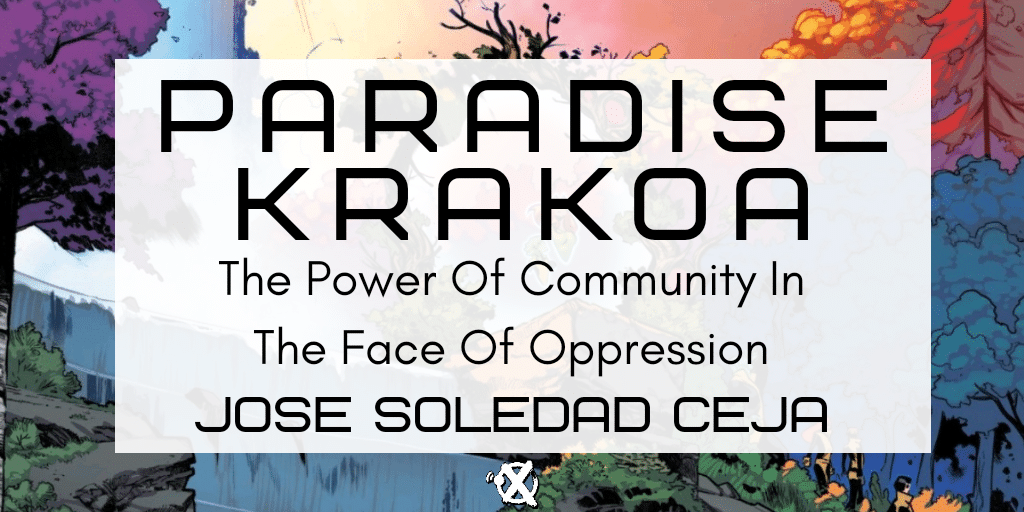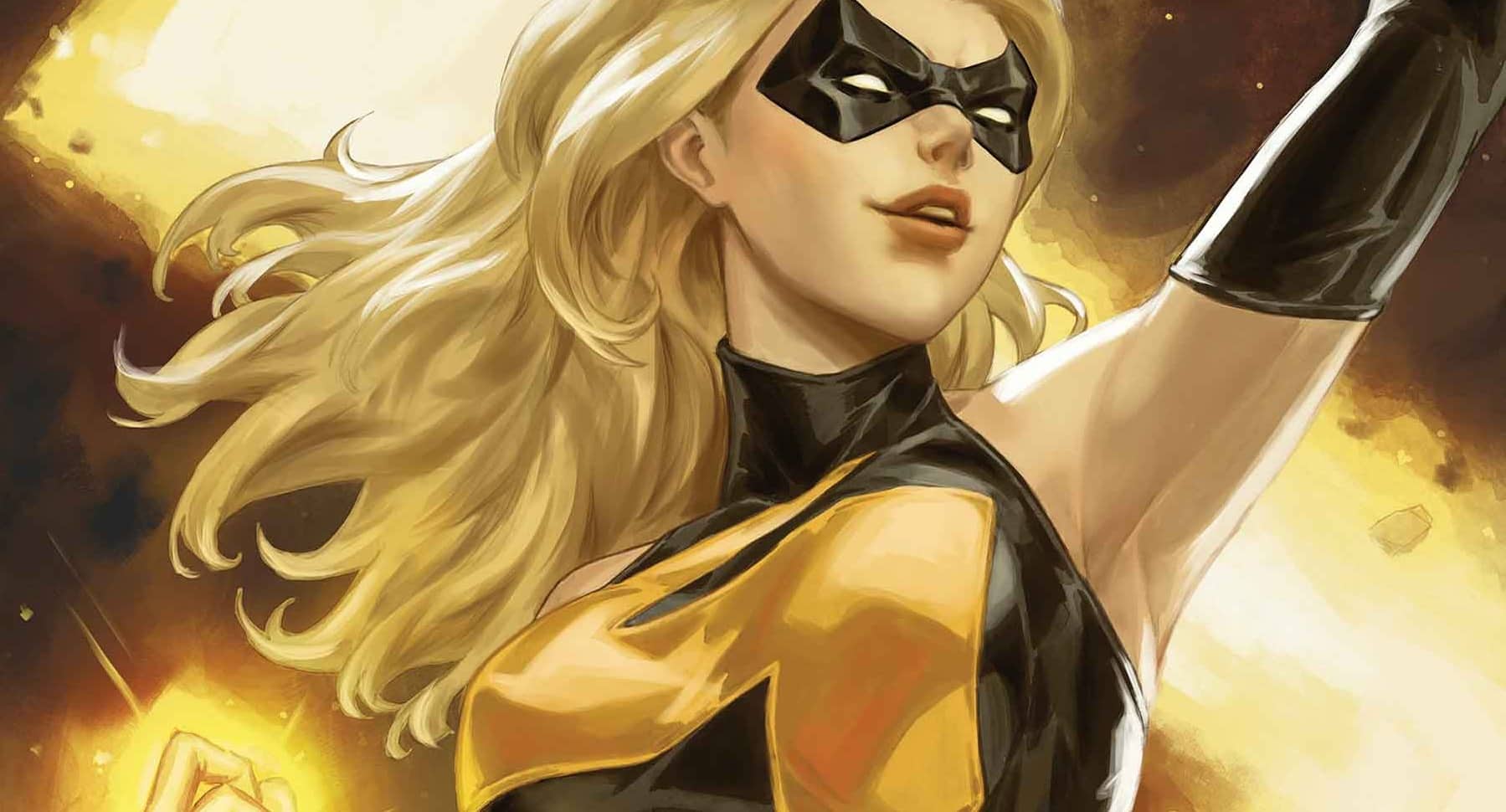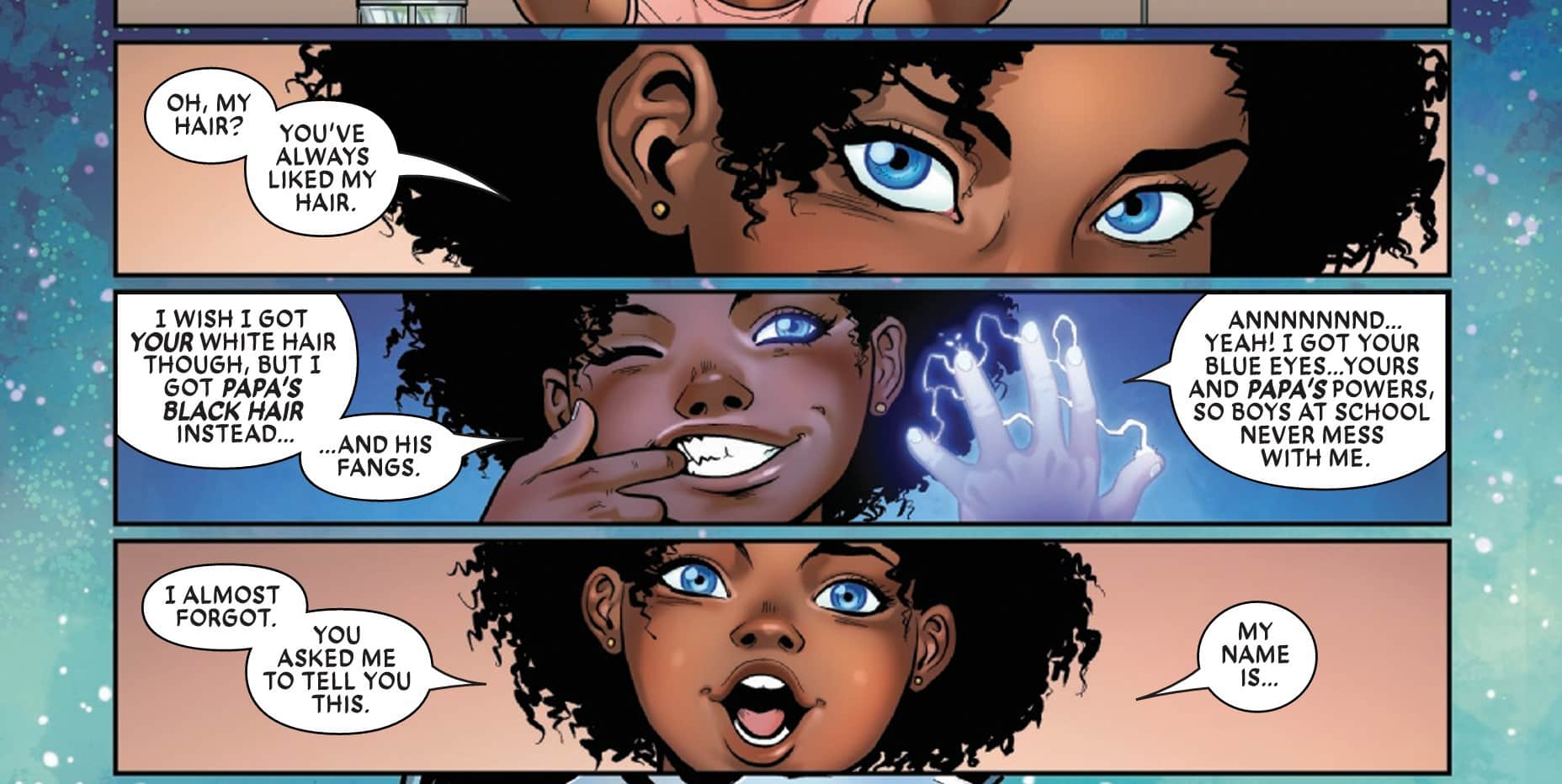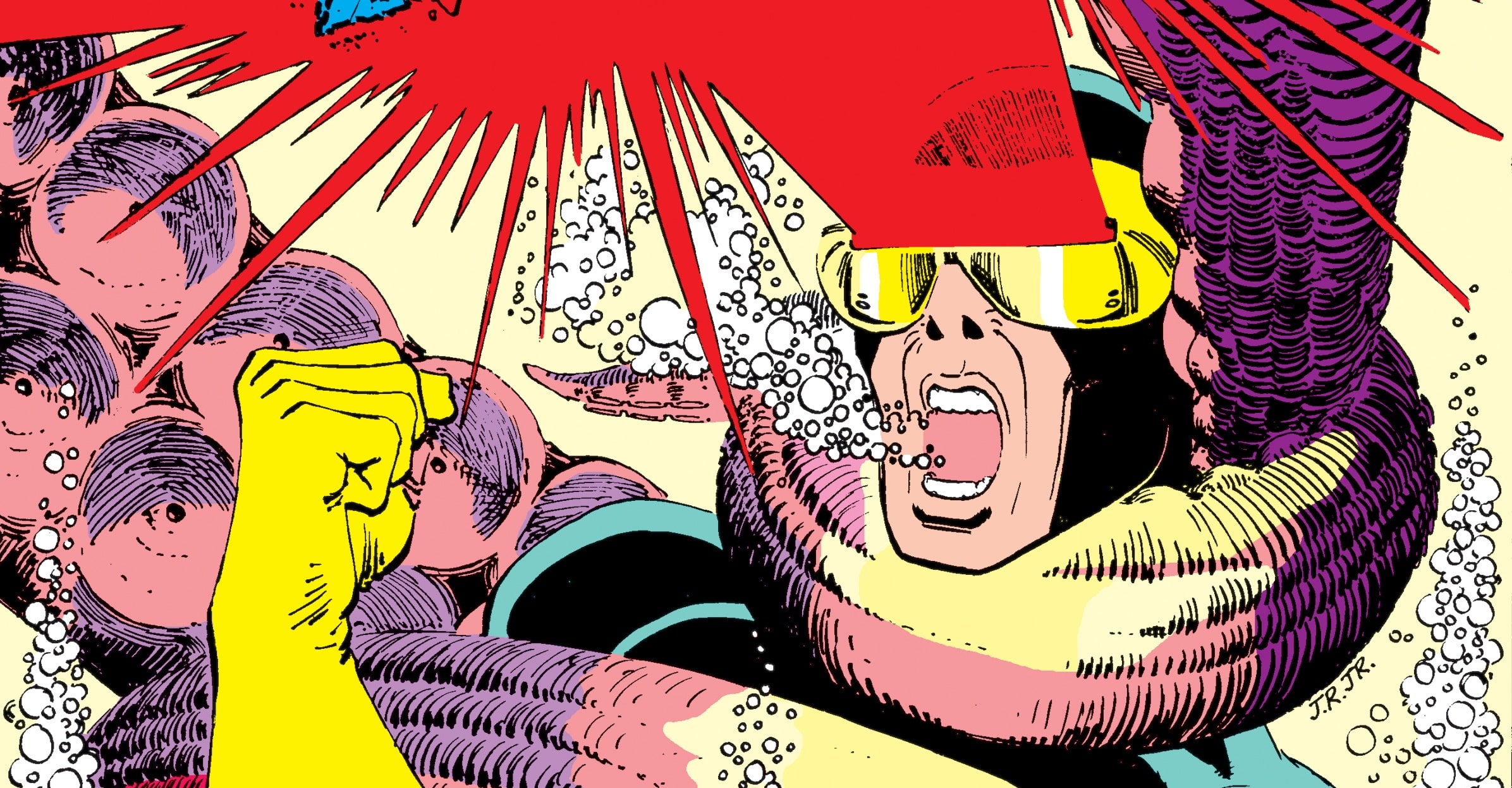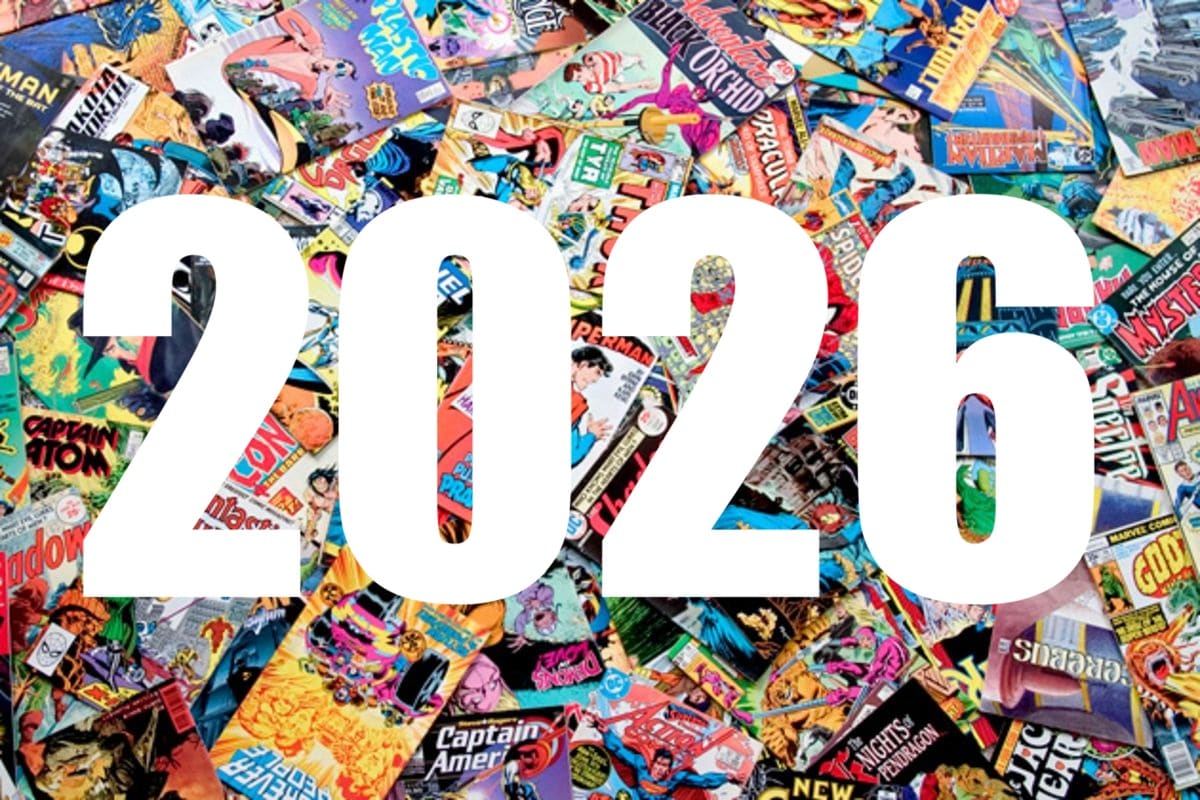“Anywhere can be paradise as long as you have the will to live,” is a surprisingly hopeful quote from an incredibly depressing place at the end of the film The End Of Evangelion. It has inspired me to keep living, and keep trying to live, through a manner of situations on countless days over the years. This idea that one can create paradise, or that there exists somewhere that is better than the one that we live in, has led revolutions and their leaders to take action and help people go from surviving to living, and in some cases, thriving. Successful revolutions and liberation ideology must be built on love, in order to be called such, and so paradise, true paradise, can only be made out of love.
Pretty often I think about the ending of the first X-Men Prime. I think about Professor X holding the body of a mutilated and murdered mutant, and crying. I always only think about his death, and the violence that bore it. I never think about how he got to that point in the first place. His name was Dennis Hogan. His subplot in the issue follows him as he continues his search for Xavier’s Mansion. His powers have manifested and he is frightened. He is looking for refuge. He is looking for paradise. Unfortunately, it finds him too late. His cross-country journey ends with him becoming the victim of a hateful gang of humans who think that having one less mutant is “a start.” Hogan’s death at the end of the issue strengthens the X-Men’s resolve to fight for a better world, a goal that would not exist if things like this did not happen. For everything to change, some things must be altered, permanently. It is this finality that some things must endure as a cost of paradise that scares me. If I’m going to paradise, I want to be able to bring along everyone I started with.

Paradise is a haven, not Heaven. It is an intermediary place; Heaven and Earth adjacent, but not Heaven or Earth itself. It is a space for repose, relief, and respite. Too often my friends, my family, and I, Black and Brown folks born and raised in the constantly cooking crock pot that is the United States of America, find ourselves in need of the rest that paradise promises. Too many days we feel overwhelmed with anguish at the sight of another person who looks like us, mangled, mutilated, and murdered, almost preventing us from being able to do our jobs. Too many days we punish ourselves because we don’t have the strength to hug each other and cry in front of people who don’t understand and don’t want to understand how these things make us feel. Too many days we have to put up with a power dynamic that does everything it can to punish us for trying to commune with one another. Paradise for us is a place to grieve and celebrate, be the most, and be the least, however and whenever we want. It is a place of safety. It is community.
Wolverine’s first identifiable appearance within House of X #1 sticks with me. The panel directs your attention on Professor Xavier looming ominously at the center, but the real interesting part of that shot is on the bottom left. When I imagine it, I completely forget that Professor X is even in it. All I can think about is Wolverine smiling as he play wrestles with children. Wolverine, the man with a heart encased in metal, not under any spell or mind control or demon or time travel gimmick, is frolicking out in the open with children. This is our first glimpse of what Krakoa is and what it means.

The etymological roots and history of the word “paradise” describe an enclosure and a garden respectively, which is exactly what mutants have made of their new nation-state on the living island of Krakoa. Although later proven to not be entirely impenetrable, for one brief shining moment, Krakoa was a pure paradise- a secure Garden of Eden where even Wolverine could let his guard down because he feels safe. Because he is safe. And the people he cares about are safe too.
This seemed to be a bit too much for people to be able to handle initially- but for someone like me, it made absolute perfect sense. The issue is not one of segregation, but of safety. Krakoa has become a place where people like Dennis Hogan can find true refuge. Krakoa and its residents’ isolation is not out of hate for humanity or a desire for dominance and oppression, but out of love. The concept of having to prove your worth, or your “agenda” (i.e. your humanity) is a cruel, dehumanizing invention. You cannot expect peace and reconciliation if your expectation is that one side is going to do all of the work. And you’re really not all about peace if you think that someone needs to convince you why they should be able to live. The other side needs to do some of the work too. It is exhausting playing teacher and peacekeeper all of the time, and it is inhuman and inhumane to expect people to bear the burden of being those things all of the time. We need breaks. We need the opportunity to live without the frustration of how much people expect us and how little assistance we get in return.
The moment I realized what Krakoa was, I felt my shoulders drop and my jaw unclench. When Black and Brown folks look at our society we see a lot of death, and brutality, and selfishness. All some people want to do is consume- our art, our family units, our bodies- until there is nothing left. It has been enough recently where I gave up hope. There is something to be said about how many stories, and in particular how many X-Men stories, where the future almost always ends up being an explicitly extreme version of the current oppression, or some kind of gross “reverse” oppression where the oppressed become the oppressors. I guess this is done for the sake of conflict, because conflict pushes plot. But what Krakoa does is imagines a future where there is no oppression or oppressing, which, in itself is (unfortunately) revolutionary. Depictions of what could be don’t have to be all bad. Things don’t need to be utopian, but they don’t need to be so demoralizing and amoral almost every single time.

The film Black Panther spoke to a lot of people because it avoided this. Black and Brown folks have it bad enough already. We don’t need to, and don’t, imagine a world where we’re fighting to overthrow an oppressive government, for fun. We try our best to imagine a world without that, while living through that. Which is why depictions of hope and paradise are so important to our survival. We need to see the promised land so that we know it’s real and not just philosophy, prophecy. Otherwise, we’ll succumb to the mire and give up.
The Avengers are a group of superheroes who fight each other and their own egos as much as they do actual villains. But that isn’t the case for X-Men. Sure there are egos flaring here and there, and they fight and disagree with each other, but that’s what family does. By choosing to live on Krakoa they have to know and love each other, wholly. In community. In All About Love, bell hooks says that love is a choice. The mutants’ choice to coexist with even those they disagree with on Krakoa is a manifestation of that definition of love, and a testament to the fact that is being established out of love. They fight knowing each other’s strengths and weaknesses, allowing each other to shine when it’s their time, and help out when it’s needed. They fight for basic survival- the right to exist.
They remind me of my friends and I, Black and Brown folks leaning on each other for validation, affirmation, and support, in a world that does everything it can to let them know it doesn’t want us. Paradise for us would look a lot like Krakoa. It’s a place that isn’t constantly asking us to pare down who we are. It’s a place where we are allowed to without risk of inspiring fear, violence, or jealousy from those we find ourselves around.

On my downer days I may look at that quote from The End Of Evangelion a different way. Some days I get mired in the possibility that paradise isn’t real- that the search for paradise may purely be philosophical, unobtainable. That what we are really working towards is just the CHANCE at paradise, and the work we put towards creating paradise may actually be paradise itself. Which, in itself, would be fine, if the path towards paradise wasn’t fraught with struggle, heartbreak and heartache, and death.
Too many folks have died needlessly: Breonna Taylor, Georgy Floyd, Oluwatoyin Salau, Sandra Bland, Philando Castile, Martin Luther King Jr., Emmitt Till, Fred Hampton, Trayvon Martin, Eric Garner, Michael Brown, Tamir Rice, Sean Monterrosa, Jamel Floyd, Freddie Gray, Oscar Grant, Óscar Alberto Martínez Ramírez, Angie Valeria Ramírez, Stephon Clark, Antwon Rose III, Alfred Olango, Alton Sterling, Walter Scott, Tanisha Anderson, Ahmad Arbery, Atatiana Jefferson, Elijah McClain, Vanessa Guillen… Paradise isn’t really paradise if everyone isn’t there to be a part of it. In order to work around this, Krakoa has The Five- five mutants who, on their own are extraordinary, but together become gods.

In real life, we have storytellers to remind us of those who came before us and those we lost. In real life they can’t ever make it to paradise. The best we can do for them is create whatever paradise we can, and never forget them and how they touched the lives of those around them, and inspire us to seek each other and make the world a place that is worthy of them and their memory. A place where they will always be a part of our community. A place where they would still be with us had it existed while they were alive. Krakoa, paradise, to me, means never having to miss anyone; no one ever needs to feel the pain of loss or the catharsis of reunion ever again. It’s paradise because we’re all together, and we’re all finally safe.

